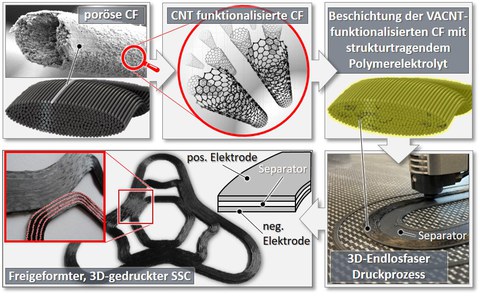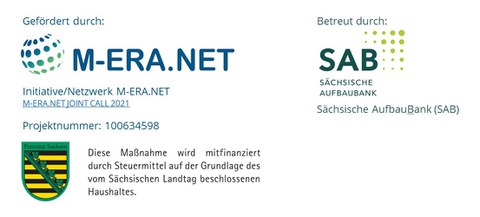04.08.2022
Auf dem Weg zur neuen Generation 3D-gedruckter, strukturtragender Supercaps

Technologiekonzept für die 3D-Endlosfaser-gedruckte, freigeformte, strukturtragende PRINTCAP-Supercaps
KICK-OFF DES EU-FORSCHUNGSPROJEKTES PRINTCAP
Am 11.07.2022 trafen sich in Paris unter Leitung von Thales Research and Technology die vier Kooperationspartner – darunter das Research Center Carbon Fibers Saxony (RCCF) der TU Dresden – zum Kick-Off für das Forschungsprojekt „Next Generation of 3D Printed Structural Supercapacitors“ (PRINTCAP). Das Projekt adressiert die Entwicklung einer neuen Generation von Superkondensatoren (Supercaps, SC) für schnellladende, strukturtragende Energiespeicher für die Automobil-, Luft- und Raumfahrtindustrie. Die Partner diskutierten gemeinsam mögliche Fertigungsrouten und erste Konzeptideen. Darüber hinaus definierten sie erfolgreich auch die ersten Prozessschritte.
Vor dem Hintergrund aktueller globaler Herausforderungen wie dem Klimawandel oder der Knappheit natürlicher Ressourcen einerseits und angesichts hoher individueller Mobilitätsbedürfnisse andererseits werden für eine nachhaltige Zukunft innovative Schlüsseltechnologien forciert. Elektrisch betriebene Fahrzeuge, frei von lokalen CO2-Emissionen, bilden das Rückgrat des Klimarahmenprogramms der EU für 2030. Die verwendeten Energiespeicher, insbesondere Batterien, erhöhen jedoch zu einem beträchtlichen Teil das Fahrzeuggewicht. Außerdem schränken sie die Designfreiheit bei der Fahrzeuggestaltung ein. Die bisherigen Energiespeicherlösungen sind schichtweise aufgebaut und müssen abgeschirmt werden, sodass deren Integration häufig wertvollen Bauraum in Anspruch nimmt. Innovative strukturtragende Superkondensatoren (Structural Supercaps, SSC) kombinieren die Energiespeicherfunktion von SC mit den hohen mechanischen Eigenschaften leichter Verbundwerkstoffe und können damit eine drastische Gewicht- und Platzbedarfsreduktion der Energiespeicher erzielen. Somit eröffnet das SSC-Konzept ein breites Feld konkreter Anwendungen wie schnellladende Elektroautos oder Paketdrohnen, welche die Energie in eigenen Chassis speichern. Insbesondere bei elektrobasierten Transportdrohnen muss aufgrund der geringen Größe sehr genau auf eine optimale Gewichtsverteilung geachtet werden, damit die Flugeigenschaften erhalten bleiben. Dafür ist es erforderlich die SSC weitestgehend frei formbar bei der Chassis-Herstellung verarbeiten zu können. Zudem müssen ins Chassis integrierte SSC erhebliche Belastungen und Vibrationen aushalten. Handelsübliche SC sind für diese Aufgabe nicht geeignet. Daher ist die Entwicklung einer neuen Generation von Werkstoffen und Systemen für derartige Einsatzgebiete von grundlegender Bedeutung.
An dieser Stelle setzt das Projekt PRINTCAP an und verfolgt die Herstellung von SSC mittels additiver Fertigungsverfahren, um künftig ihre endkonturnahe Anordnung im Bauteil zu ermöglichen. Das PRINTCAP-Konzept von endkonturnah freigeformten SSC vereinbart Gewicht- und Platzbedarf-optimierte Leichtbaustrukturen mit der Energiespeicherfunktion. Für den direkten Transfer in die Industrie macht sich PRINTCAP zum Ziel, effektive Design- und Fertigungskonzepte für strukturtragende, freigeformte SSC zu entwickeln, die von der Konzeptphase bis zum Demonstrationsnachweis reichen. Die zu entwickelnden Konzepte sollen schließlich gemäß dem Cradle-to-Cradle Prinzip ebenfalls erste Lösungen zum Recycling der verwendeten Materialien sowie Studien zur Lebenszyklusanalyse beinhalten. Hierfür greift PRINTCAP u. a. auf die Expertise der faserverstärkten Materialentwicklung des Research Center Carbon Fibers Saxony (RCCF) der TU Dresden zurück. Zusätzlich bringt die Hochschule für Technik, Wirtschaft und Kultur (HTWK) Leipzig ihr Spezialwissen im Verbunddesign multifunktionaler Werkstoffe ein. Thales Research and Technology und NAWATechnologies ergänzen die Teamkompetenzen mit ihren technologischen Alleinstellungen im Bereich der strukturtragenden Elektrolyte und der Fertigung von Kohlenstoffnanoröhren-basierten Supercaps. Mit der synergetischen Kombination von Energiespeicher und Leichtbau legt das Projekt PRINTCAP die Basis zur freiformbaren Herstellung von schnellladenden, strukturtragenden, ressourceneffizienten Energiespeichern.
Projekt PRINTCAP: „Next generation of 3D printed structural supercapacitors“
Förderung / Finanzierung
Laufzeit
01.06.2022 – 31.05.2025
Projektpartnerschaft mit
Konsortialführung: Thales Research and Technology (TRT)
Professur Leichtbau mit Verbundwerkstoffen an der Hochschule für Technik, Wirtschaft und Kultur (HTWK) Leipzig
NAWATechnologies
Research Center Carbon Fibers Saxony (RCCF) der TU Dresden, gemeinsame Forschungsinitiative des Instituts für Leichtbau und Kunststofftechnik (ILK) und des Instituts für Textilmaschinen und Textile Hochleistungswerkstofftechnik (ITM)
Teilprojekt der TU Dresden: Entwicklung von energiespeichernden Kohlenstofffasern und Endlosfasertapes für den 3D-Druck der PRINTCAP strukturtragenden Supercaps
Projektleitung an der TU Dresden
Prof. Dr.-Ing. Niels Modler (Professur für Funktionsintegrativen Leichtbau)
Ansprechpartner:innen am RCCF
Dipl.-Ing. Daniel Sebastian Wolz, FG Sonderwerkstoffe und Verbindungstechniken am ILK, Teamleiter Kohlenstofffasern am RCCF, Tel. +49 (0)351 463-44046,
Dr.-Ing. Thomas Behnisch, FG Sonderwerkstoffe und Verbindungstechniken am ILK, Fachgruppenleiter, Wissenschaftliche Leitung am RCCF, Tel. +49 (0)351 463-42503,
Abbinder
Das Research Center Carbon Fibers Saxony (RCCF) der TU Dresden ist eine gemeinsame Forschungsinitiative des Instituts für Leichtbau und Kunststofftechnik (ILK) und des Instituts für Textilmaschinen und Textile Hochleistungswerkstofftechnik (ITM) im Bereich maßgeschneiderter Kohlenstofffasern für zukunftsweisende multifunktionale Strukturwerkstoffe. Das Zentrum wird aus Wissenschaftler:innen gebildet, die durchgängige Entwicklungsketten vom Faserrohstoff bis zum fertigen Bauteil entwickeln. Die Partner erforschen fossile und nachwachsende Rohstoffe als Ausgangsprodukte und entwickeln maßgeschneiderte Kohlenstofffasern für neue Funktionswerkstoffe. Darüber hinaus wird der Fokus auf die Anwendung der Fasern für neuartige Struktur- und Funktionswerkstoffe gesetzt. Die Erkenntnisse werden direkt in die Lehre an der TU Dresden übertragen. Weiterhin legen die beteiligten Wissenschaftler besonderen Wert auf den Transfer der errungenen Kenntnisse in die industrielle Anwendung.
www.tu-dresden.de/mw/rccf

